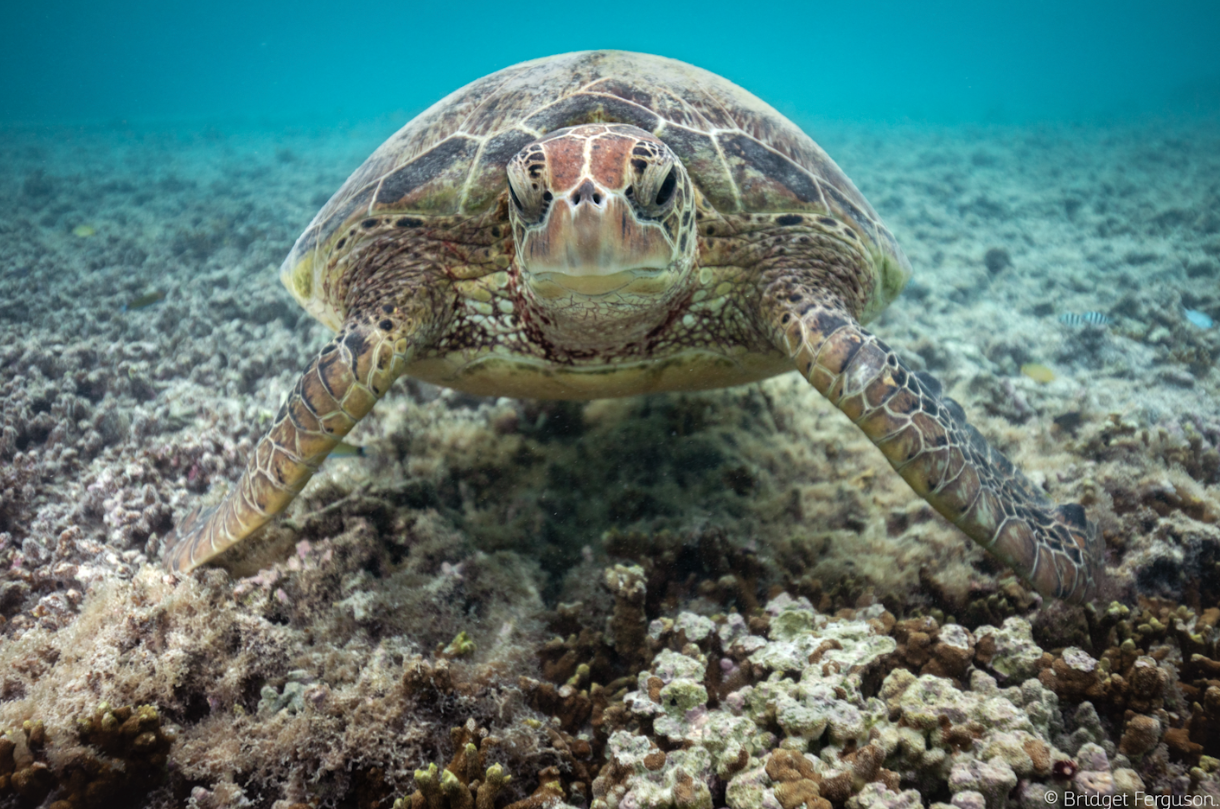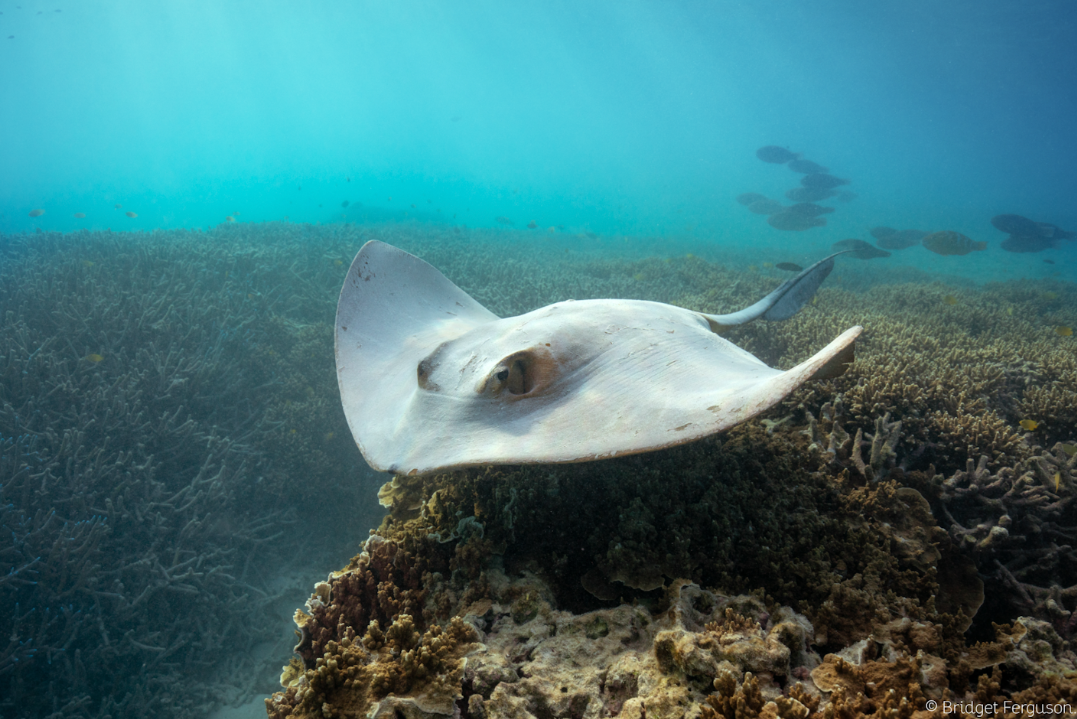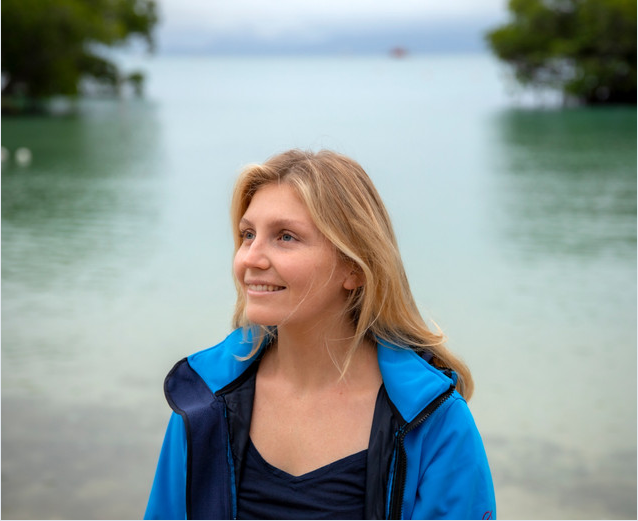There’s a tension in the circle. It’s holding us together and keeping us apart, a bubbling up and a biting of tongues, and a new, live practice of listening. We’re on the beach in our first Climate Café.
I’m nervous, facilitating for the first time. We all revere the Great Barrier Reef and know that despite existential threats from poor water quality, unsustainable fishing, and coastal development, climate change threatens our beloved reef above all else.
We wiggle into wetsuits, squish a snorkel between our teeth, and with nothing but dive masks separating us from the big blue, we bear witness to the deadly aftermath of coral bleaching.

We often talk of the horrors of climate change and coral bleaching. But we don’t often talk about what it does to someone – to watch an ecosystem collapse.
We try it now, many of us for the first time, attempting to match these emotions with words, and speak them aloud amongst peers. We’re a bit awkward, but committed, so we fiddle with the sand to make it easier somehow. We're doused with the temptation to correct each other, to help, to fix, solve, prove, heal, explain, question…hush. Instead, we cup rough grains of white sand, let them fall through our fingers and try again to listen.
We talk of timelines. My mind bends to comprehend what 6,500 years on Earth mean; the age of the Great Barrier Reef as we know it. I grasp far beyond my reach, imagining deep time; when generations of Aboriginals and Torres Strait Islanders were warmed by fires and hunted kangaroos on lands where the reef is now, because the Coral Sea wasn’t a sea yet. I wonder if we are the first to sit in a circle here.
The Gooreng Gooreng, Gurang, Bailai and Taribelang Bunda peoples are the Traditional Owners of what we now call, Heron Island. It’s the namesake of the elegant, long-legged seabird that flocks the islet, and is accessible by ferry from a Queensland town known for its smoking horizon and glittery port.
Its coal terminal is one of the largest in the world, and has exported over
1.5 billion tonnes of coal. 1.5 Billion. It’s another number I struggle to fathom.
But when the ferry launched – reef bound, we cruised past the smoking stacks pumping pollution into the atmosphere, and choiceless, I breathed it in.
The reefs here are considered some of the most majestic in the world. A moment ago, we were in the water, the snorkelling was still spectacular, still fun, and life surrounded me in every direction. A pipefish was hiding under peaks of coral rubble, a turtle was munching and crunching; left a trigger, right a glimmer. Immersed in a brine of awe and wonder, grief and sorrow, I glided over the fuzzy graveyard of algae-ridden coral skeletons, delighted by every vibrant pop of colour swimming by.

Proud and embarrassed, we speak up for ourselves; we lament reefs already changed and lost; we encourage each other; confess our exhaustion; reveal the beauty and burden of loving nature amidst a nature crisis. But wait, is crisis the right word? We try to figure it out together. But we can only agree that an ongoing crisis seems incomprehensible.
I feel maddened, guilty, and lucky; discussing this tragedy – here – inside the jewel of the sea. ‘Why do I feel so alone in this climate mess – alone in my generation, my profession, my country, my family?’ We ask it in 100 different ways. ‘Me too,’ we all respond silently, nodding in accord.
I retreat to some private place in my mind, only to find a tiny seed of connection lodged there, longing for sense to grow from it.
I wonder what the reef might say, should we have the ears to hear more than the fading snap, crackle, pop* of this busy coral metropolis.
We’ve been good listeners. Now we drift in and out of focus, the sand cools beneath us, the sun sets in a blaze of hot colour right before our eyes, then disappears.

*******
*To hear the snap-crackle-pop sounds of the reef, click the link in the article and scroll down, or click here to go straight to the audio file. If you’d like to see how your carbon footprint compares to the 1.5 billion tonnes of coal exported from a single port, visit the What Can I Do page.
Bridget Ferguson is a writer, freediver & photographer. She is the Communications Coordinator for PSC & a CoralWatch Ambassador, she loves capturing stories of the Pacific.





